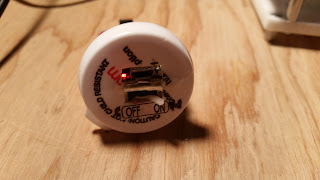Background
I started looking at a way to make a cheap power meter and realized that my Turbidity Meter project provides a nice remote voltmeter capability. So I decided to "generalize" the design and packaging.
Laser power meter
The first place I will probably use it is on the laser power meter because I can close the lid of the cutter and watch the voltage from remote. I also realized that I can log the data going to the BT app and later use it to analyze the dynamic nature of the output of the Peltier module. I am still not sure if this approach to laser power measurement will be useful and practical but I'm plowing forward until I prove it does not work.
The BT voltmeter design
Very simple it uses an Adafruit Feather 32u4 Bluefruit LE. The build information is here https://learn.adafruit.com/adafruit-feather-32u4-bluefruit-le/overview.
Some build hints are:
- The fragment of code that waits for the serial port is more important than the comments suggest, I dont think it needed just for Gemma. I had trouble with the Feather if I removed it.
- I had to disable serial communications when not connected to the PC otherwise it would hang in startup. I used A0 and when gnded it tells the controller that its connected to the USB port. I tried code-based ways to detect the serial and none worked reliable during startup. I will add this to my to-do list.
- I am running with a battery and at first it was not apparent how to turn power on and off without disconnecting the battery. You can't switch the battery as it needs to charge. Turns out just switch the En pin to gnd to turn the Feather on and off.
- When using the A/D remember that the reference voltage for the Feather is 3v so adjust the voltage calculations accordingly.
The package
The packaging needed to be modular with the LEDs on the board visible. I wanted everything mounted and wired independent of the pill-bottle. I looked for something that was laying around easy and quick, I settled on a pill bottle package.
- The Feather is hot glued to a piece of acrylic that is the width of the bottles diameter.
- The battery is glued to the bottom.
- The entire assembly is inserted into the bottle and the cap is snapped on.
- The power switch and USB connector sticks through the bottles cap and the output connector which has 4VDC, GND and Analog IN, sticks out the back.
- Two jumper pins for the "serial present" function are accessible through the side and a hole provides access to the reset button.
 |
| Everything on one substrate |
 |
| Power switch and usb port |
 |
| Jumper pins and reset hole |
Phone App
Adafruit provides a phone app that includes a BT-UART function. However I found the nRF UART v2.0 app better fit my needs. Both did the job .....
Next
I plan to use this meter to further my testing on the Laser Power meter.
Maker Don,




No comments:
Post a Comment